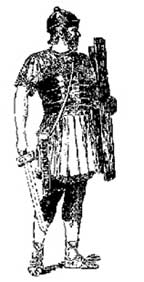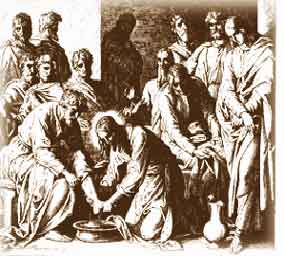
Laws, Loves, and Liberty
For centuries men have gathered together in order to institute forms of government to secure to themselves and their posterity the blessings of liberty under God by the securing of natural rights. To guarantee the loyalty or fidelity of the members of their community or nation in the face of chaos and calamity, in what is often a perilous world, numerous methods and schemes of society and government have been relied upon or applied.
The symbiotic relationship of men and their governments alters both. This change is wrought according to the spirit moving in the hearts and mind of the people. Government has no mind, no heart, no soul of its own. Its character is entirely dependent upon the character of the people who form it, give it purpose, and life. There seems to be two forms of fidelity at war in the formation of all governments. One born of the “love of law” and the other born of the “law of love”.
Because the opinions of men are as varied as men themselves we must define terms like law and love to understand the conflict and the paradox.
Two Kinds of Law
Though, “[I]t was believed that the King derived all the power he enjoyed in the colonies from the compacts [charters and contracts] he had made with the settlers.” The “Natural law was the first defense of colonial liberty.”
“In respect to the ground of the authority of law, it is divided as natural law, or the law of nature or of God, and positive law.” The Law of Nature or Natural Law is, “The divine will, or the dictate of right reason, showing the moral deformity or moral necessity that there is in any act, according to its suitableness or unsuitableness to a reasonable nature.” Positive Law is, “Law actually ordained or established, under human sanctions, as distinguished from the law of nature or natural law, which comprises those considerations of justice, right, and universal expediency that are announced by the voice of reason or of revelation…”
Understanding the difference between Natural and Positive law is necessary in order to understand either. One critical difference is found in the maxim:
“The laws of nature are most perfect and immutable; but the condition of human law is an unending succession, and there is nothing in it which can continue perpetually.”
“Human laws are born, live, and die.”
It is “love of human law” of which we warn because it is not only dependent upon the character of those who create it but it is subject to change and mutation. The laws men make for themselves are created by contracts and constitutions, which requires the consent of the people. “All government without the consent of the governed is the very definition of slavery!” This is because “What is mine cannot be taken away without consent.” “The civil law is what a people establishes for itself.”
That consent may or may not be written. It may be given by our deeds or lack of them.
The Declaration of Independence was not about rebellion by the people, but the unwarranted usurpations of George III in his rebellion against the Charters and the rights subsequently obtained through natural exercise of responsibility of men engaged in a noble struggle long before any declaration was applied with ink to paper.
Americans had begun to realize that with every right there is a correlative responsibility. It was there uncommon struggle to accept the burden of those responsibilities for centuries prior to the revolution that set Americans free. It was the daily unselfish sacrifice of settlers who cared for themselves, their families, and their neighbor which set the spirit of liberty a flame in the hearts and minds of the people. The exercise of responsibility by those who came to America seeking civil and religious freedom had made the King's acts both an unwarranted breach and usurpations of natural rights.
That Declaration did not complain of taxation without representation but, “For imposing taxes on us without our Consent:” Governments receive all their lawful power to govern through the consent of the governed. That consent is given by executed or implied acts of agreement. Those agreements are the contracts. And “The contract makes the law” i.e human law.
There is no perfect contract because there are no perfect men. Contracts create obligations and power. “Constantly bearing in mind that entering into society individuals must give up a share of liberty…” The more power governments obtain authority by contract the less liberty the people have. No creation of an alternative institution or government may free us from or impair that obligation of contract.
“Pacta sunt servanda.”
The more we seek to benefit from institutions of government the more we enter into their realm of authority and the less liberty we will have. The more we seek to provide for ourselves and our community without a reliance on government the freer we will become. “As long as we look to government to solve our problems we will always suffer tyranny.”
Two Kinds of Love

Some people love cats and some cats love birds, but these two kinds of love produce entirely different results.
There is the love for things that give us life and the love we have that gives life to others. If the latter gives us life more abundant then the former will take away our lives. It is a selfish love of desire taking from others for the benefit of ourselves. It is the dominance or presence of one form of love or the other in the hearts and minds of the people that determines the nature of their government and the freedom and liberty enjoyed by their society.
This truth is why the Bible tells us in the words of Moses and Christ that we must love our neighbor, his rights, his life, and his liberty, his soul as much as we love our own. If we do not, then the government we create shall be more a snare than a salvation. Many have understood that “This Bible is for the Government of the People, by the People, and for the People.”
“When people have to obey other people’s orders, equality is out of the question.” The Bible warns us not to consent, not to make covenants or contracts, to not take oaths or swear, but also to not take benefits from men who can exercise authority.
While it is good to take care of the needy of your society it must be done by charity. One reason to avoid men who call themselves benefactors but exercise authority is because they only offer to us what they have already taken from our neighbor and we know we are not to covet our neighbor's goods. Once we accept the idea that it is okay to take from our neighbor as long as it is taken by government first, then a whole nation may be corrupted.
“All who have ever written on government are unanimous, that among people generally corrupt, liberty cannot long exist.”
There are several reasons why we should not want to benefit in such social schemes, but at least one is to keep us from being snared back into the bondage of Egypt.
Men who seek power often offer benefits to get the people to enter deeper into the realm and authority of government until what should have been for our welfare becomes a trap and a snare. While it is essential for a society to take care of its needy the methods of modern Socialism lead only to despotism and destruction.
“The real destroyers of the liberties of the people is he who spreads among them bounties, donations and benefits.”
It is not love to covet our neighbor's goods, to wish to compel our neighbor's contributions to secure our personal welfare. Christ made it clear that covetousness comes from within, and defile the man. It is that temptation offered by some forms of government that causes neighbor to consume neighbor and destroys the potential for liberty in our societies. Thou shalt not covet was the foundational law of a free society and socialism imposed by government is the antitheses of that law. Those who desire the benefits of governments that exercise authority are Antichrist and criminals in the eyes of God's law. They are classified in the status of thieves and robbers, adulterers and fornicators, of liars and deceivers and certainly do not love one another.
“While they promise them liberty, they themselves are the servants of corruption: for of whom a man is overcome, of the same is he brought in bondage.” 2 Peter 2:19
The cruelty of covetous social welfare schemes implemented by an exercising authority brings us into bondage. Christ instituted the Church to provide for the needs of the people by faith, in hope and through charity under the perfect law of liberty so that they would never have to apply to those rulers of nations who exercise authority one over the other in the provision of their welfare and benefits.
A Christians prayers was only to God the Father and not the fathers of earth.
The Modern Church often talks about love but they send the needy of their congregations to those false benefactors who make men merchandise, humane resources. They have abandoned the “rituals and ceremonies” of “pure religion” found in the early Church. The Churches have failed the people and have done contrary to the early Church and the words of Christ who came to set them free.
We cannot expect to be free until we set our neighbor free from our own desires.
Footnotes:
|

